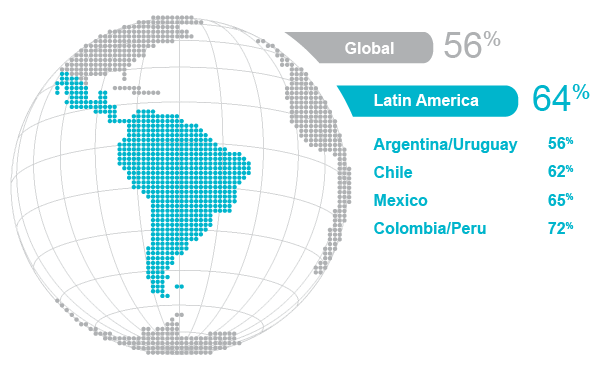Latin America has the Greatest Global Demand for ESG Investments
Financial professionals agree. Many institutional investors and financial professionals say ESG investing has the potential to generate alpha and mitigate governance and social risks, such as loss of assets due to lawsuits, social discord, or environmental harm.1
Our recent report brings all these opinions together and reveals insight into what may help shape the long-term success of ESG investing in Latin America.
Latin American investors display the highest global demand for ESG
They want investments that are in line with their values and the things that matter most to them. 85% of Latin American investors feel that customizing their investments to meet their personal values is important.2Nearly two thirds (63%) say they consider their investments to be a way of making positive social and/or environmental impact.2 Another 57% believe their investments can have a positive impact on the world, compared to 47% globally. That’s the highest number in all the regions surveyed. And 69% say if a fund demonstrated a better carbon footprint than others, they would be more inclined to buy it.3
Integrity matters to Latin American investors
Many Latin American investors believe that companies that exhibit higher integrity in their practices will perform better than their peers.3
 Individuals vote with their wallets
Individuals vote with their walletsTo understand how investors view ESG, think of them as consumers. They’ve used the power of the wallet for years, buying products from companies who fit their values and avoiding products from those who don’t. Many see investing the same way. This interest in ESG may come from investors’ desire to make this connection with their values. Latin American investors take action based on their ESG values.3
Latin American institutions see value in ESG investing
Our research shows that institutional investors also see the potential for ESG investing. They agree that it offers the best of both worlds: It can help them enhance risk adjusted returns and help them align their assets with organizational values:4- 62% agree that there is alpha to be found in ESG investing
- 54% say they are currently incorporating ESG factors
- 51% believe ESG helps mitigate risk
- 62% say incorporating ESG will be a standard practice for all managers within five years

Align investment strategies with organizational values
43%

Minimize
headline risk
24%

Satisfy investment policy mandate
24%

Generate higher risk-adjusted returns
19%

Access new sources of return
14%

Benefit from new
sources of diversification
14%
Read our full survey findings on ESG investing
Get more insight into how ESG investing can help individuals and institutions align investments with values.
The 2019 Cross-Survey ESG Report sources data from the Natixis Investment Managers Global Survey of Individual Investors, Global Survey of Institutional Investors, Global Survey of Financial Professionals and Global Survey of Professional Fund Buyers.
- Natixis Investment Managers, Global Survey of Financial Professionals conducted by CoreData Research in March 2018. Survey included 2,775 financial professionals in 16 countries.
- Natixis Investment Managers, Global Survey of Individual Investors conducted by CoreData Research, August 2018. Survey included 9,100 investors from 25 countries.
- Natixis Investment Managers, Global Survey of Institutional Investors conducted by CoreData Research in October and November 2018. Survey included 500 institutional investors in 28 countries.
- The Natixis Investment Managers Global Survey of Professional Fund Buyers was conducted by CoreData Research in October and November 2018. The survey included 200 respondents in 22 countries throughout North America, Latin America, the United Kingdom, Continental Europe and the Middle East.
2 Natixis Investment Managers, Global Survey of Individual Investors conducted by CoreData Research in February and March 2019. Survey included 9,100 investors from 25 countries, 1,200 of whom are in Latin America.
3 Natixis Investment Managers, Global Survey of Individual Investors conducted by CoreData Research, August 2018. Survey included 9,100 investors from 25 countries, 1,200 of whom are in Latin America (Argentina/Uruguay: 300, Chile: 300, Colombia/Peru: 300, Mexico: 300).
4 Natixis Investment Managers Global Survey of Institutional Investors conducted by CoreData Research in October and November 2018. Survey included 500 institutional investors in 28 countries, 39 of whom are in Latin America.
Investing involves risk, including the risk of loss.
Sustainable investing focuses on investments in companies that relate to certain sustainable development themes and demonstrate adherence to environmental, social and governance (ESG) practices; therefore the universe of investments may be limited and investors may not be able to take advantage of the same opportunities or market trends as investors that do not use such criteria. This could have a negative impact on an investor's overall performance depending on whether such investments are in or out of favor.
Alpha is a measure of the difference between a portfolio's actual returns and its expected performance, given its level of systematic market risk. A positive alpha indicates outperformance and negative alpha indicates underperformance relative to the portfolio's level of systematic risk.
This material is provided for informational purposes only and should not be construed as investment advice.
2636705.1.1




 All back to bonds?
All back to bonds?
 Mirova B(ey)ond Green - Sustainable bond investments: What's new?
Mirova B(ey)ond Green - Sustainable bond investments: What's new?
 Mirova B(ey)ond Green - How can the emergence of ‘transition finance’ boost the market for labelled bonds?
Mirova B(ey)ond Green - How can the emergence of ‘transition finance’ boost the market for labelled bonds?
 Mirova B(ey)ond Green - Chemistry, the ugly duckling of ESG...shunned by markets in 2023
Mirova B(ey)ond Green - Chemistry, the ugly duckling of ESG...shunned by markets in 2023